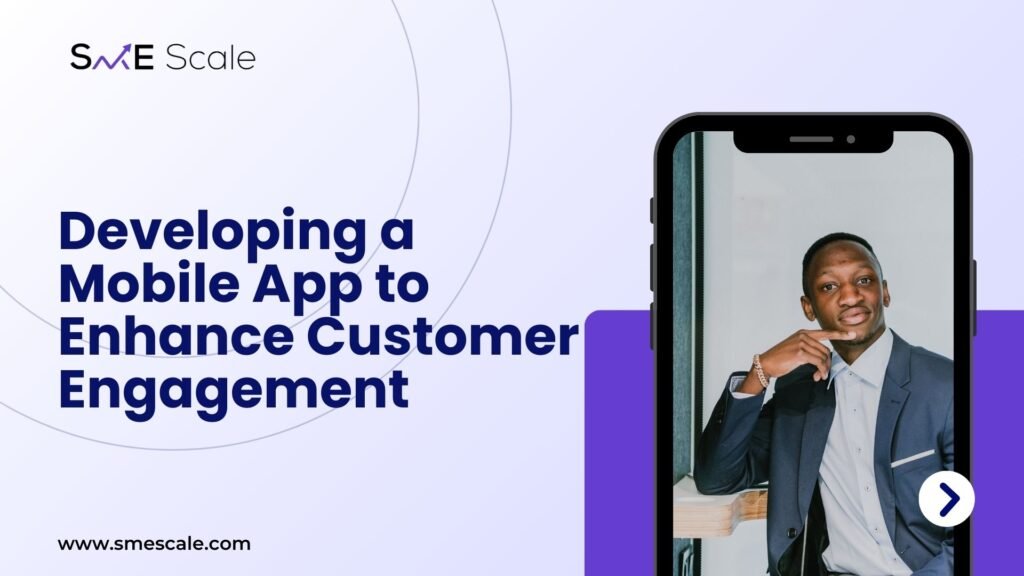
In today’s mobile-first world, having a dedicated mobile app is no longer a luxury—it’s a necessity. For small and medium-sized enterprises (SMEs), mobile apps provide an unparalleled opportunity to engage customers, build loyalty, and drive revenue growth. By combining innovative features with a seamless user experience, a mobile app can transform how businesses interact with their audience.
In this blog, we’ll explore the benefits of developing a mobile app to enhance customer engagement, present a real-life success story, and dive into the psychology behind why apps are so effective in building customer relationships.
Why SMEs Should Invest in Mobile Apps
A mobile app acts as a direct communication channel between a business and its customers. Unlike websites or emails, apps live on a customer’s smartphone, offering constant visibility and convenience.
Key Benefits of Mobile Apps for SMEs:
Direct Communication
Push notifications and in-app messaging allow businesses to share updates, promotions, and personalized offers in real-time.
Enhanced User Experience
Apps provide a tailored experience, offering faster load times, offline access, and features designed specifically for mobile devices.
Improved Customer Loyalty
Loyalty programs, exclusive offers, and rewards integrated into the app encourage repeat business.
Valuable Data Insights
Mobile apps track user behavior, preferences, and purchasing patterns, helping businesses make data-driven decisions.
Brand Visibility
A well-designed app keeps your brand at the forefront of your customers’ minds every time they unlock their phones.
The Psychology of Mobile App Engagement
The effectiveness of mobile apps lies in their ability to leverage psychological principles:
Convenience and Accessibility
Apps make it easy for customers to interact with a brand anytime, anywhere. This sense of convenience fosters engagement and loyalty.
Personalization
People respond positively to personalized experiences. Mobile apps can use customer data to offer tailored recommendations and content.
Gamification and Rewards
Incorporating elements like points, badges, and rewards taps into customers’ intrinsic motivation, making them more likely to engage with the app regularly.
Habit Formation
Apps that provide consistent value become part of a user’s daily routine, creating a habitual connection with the brand.
Real-Life Case Study: SME Scale and App Development Success
One of SME Scale’s clients, a local coffee shop chain, successfully developed a mobile app to enhance customer engagement. Before the app’s launch, the business struggled with customer retention and lacked a cohesive loyalty program.
The Challenge
The coffee shop needed a cost-effective way to retain customers, increase repeat visits, and compete with larger chains offering sophisticated digital solutions.
The Solution
SME Scale guided the business through the app development process, focusing on features that aligned with customer needs:
Loyalty Program Integration: The app included a digital loyalty card, allowing customers to earn points for every purchase and redeem rewards.
Push Notifications: Customers received personalized offers and updates on new menu items.
Mobile Ordering: The app enabled customers to order ahead and skip the line, enhancing convenience.
Feedback Mechanism: A built-in feedback form allowed customers to share their opinions, creating a sense of involvement.
The Results
Increased Customer Retention: The loyalty program led to a 25% increase in repeat visits.
Higher Sales: Mobile ordering accounted for 30% of total sales within three months.
Improved Customer Satisfaction: Feedback scores rose by 40%, highlighting the positive impact of the app’s features.
Brand Visibility: The app became a core part of the coffee shop’s marketing strategy, driving engagement through push notifications and exclusive offers.
This case underscores the importance of aligning app features with customer expectations to maximize engagement and loyalty.
How SMEs Can Develop a Mobile App
Define Your Objectives
Identify the primary goals of your app, whether it’s increasing sales, improving customer retention, or streamlining operations.
Understand Your Audience
Conduct surveys and analyze customer feedback to determine the features and functionalities your audience values most.
Partner with Experts
Collaborate with app developers and marketers, like SME Scale, to ensure your app is user-friendly, visually appealing, and aligned with your business goals.
Focus on User Experience
Ensure the app is intuitive, responsive, and provides a seamless experience across devices.
Promote the App
Leverage your website, social media channels, and in-store signage to encourage customers to download and use the app.
Analyze and Optimize
Use analytics to track user behavior and continuously improve the app’s features and functionality.
The Role of SME Scale in App Development
SME Scale offers tailored solutions for SMEs looking to develop mobile apps. From conceptualizing the app’s design to integrating marketing strategies, SME Scale ensures that the app enhances customer engagement and delivers measurable results. Their expertise in digital marketing, business automation, and user experience design helps SMEs create apps that stand out in a competitive market.
Conclusion
A mobile app is more than a digital tool—it’s a bridge between your business and your customers. By providing convenience, personalization, and rewards, apps create an engaging and loyal customer base. For SMEs, investing in app development is a strategic move toward building stronger relationships and driving long-term growth.
Whether you’re considering developing your first mobile app or enhancing an existing one, SME Scale can guide you every step of the way. Take the leap today and discover how a mobile app can revolutionize customer engagement for your business.

